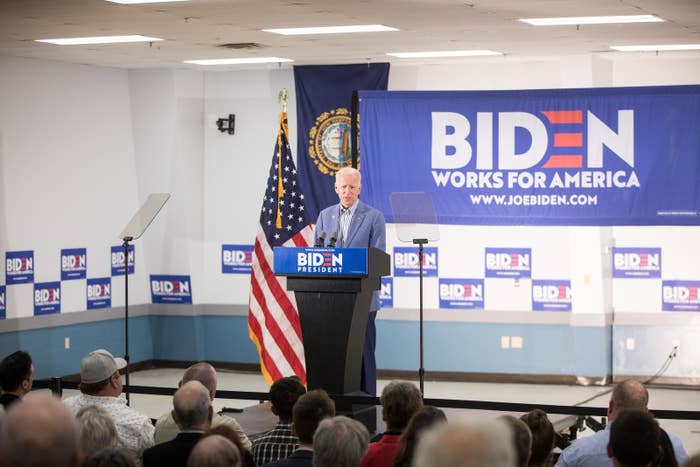
CONCORD, New Hampshire — Joe Biden contended that saying he'll cut the prison population by half or a third is "not a rational way to do it."
Asked by a local woman, who described herself as an "ACLU voter," whether he would commit to reducing the federal prison population by half, the Democratic presidential candidate launched into a multipronged response about who makes up the prison population, the 1994 crime bill, reforming the laws that put people into prison in the first place, and then, finally, answered that "to make a commitment I will cut arbitrarily in half or by a third or by 90% is not a rational way of going about it."
Biden spoke at the International Brotherhood of Electrical Workers Local Union 490 in Concord on Tuesday evening, first in a speech that brought the room to engaged silence while he spoke gently about family dignity, then in a series of extended Q&As about a range of topics, including criminal justice.
Calling the woman's question "very good," Biden laid out a series of points: First, that the majority of incarcerated people serve time in state, not federal, prisons; second, that during the Obama administration, he was "proud" to stand with the president in reducing the federal prison population; and third, that during the '90s, as senator, he tried to set up and fund drug courts but Republicans would not fund them.
"Here’s the deal," he said. "Folks, there are some circumstances in which people should be behind bars, because, in fact, they have committed a heinous crime and they remain a threat to society. But to arbitrarily say, ‘I’m just going to make a commitment I will cut arbitrarily in half or by a third or by 90%’ is not a rational way of going about it."
Biden said, to applause, that the "rational way" is to make sure we are not putting people in jail who have not committed violent crimes (opting for work programs instead) and are reconsidering laws that "really shouldn’t be on the books."
Biden also said, "We should not be putting people in prison for drug offenses," praised New Hampshire for getting rid of the death penalty, and offered a brief defense of the 1994 crime bill (officially known as the Violent Crime Control and Law Enforcement Act of 1994), once considered a bipartisan achievement and now the source of deep and bipartisan criticism 25 years later. "When I wrote the crime bill, which you've been conditioned to say is a bad bill," Biden said, "there’s only one provision that had to do with mandatory sentences that I opposed, and that was a thing called the 'three strikes and you're out,' which I thought was a mistake, but had a lot of other good things in the bill." He then went on to talk about drug courts.
After speaking for a few minutes, Biden said that there was too much to go into more detail, but he closed the answer by circling back around to funding for legal aid programs and civil liberties. "You make a really good point, kiddo," he said. "The fact of the matter is, the single most important thing we can do is [make sure] the civil liberties portions of our administration of justice are in fact adhered to."
After the event, asked what she thought of Biden’s answer, the questioner, Mattison Howard, said, “Our prison population right now is four times what it was in 1997. It’s more than reasonable to say, ‘Reduce it by half.’
“I wish he would’ve talked more about specific policies that could reduce our ridiculously high prison population,” she added.

